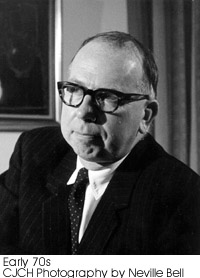
Year Born: 1918
Year Died: 1986
Pioneer
Griffiths, Stuart (1918-1986)
Stuart Griffiths was an inspired visionary with tenacious vitality who had key roles at both the Canadian Broadcasting Corporation and CTV, Canada’s first private network.
He was born into a working class family and early acquired a deep social conscience. He worked his way through the University of Toronto by selling and repairing radio sets and became intrigued by the power of broadcasting. After graduating, he joined the CBC where he was soon head of the English language international short wave service in Montreal.
At 31, he was appointed program director for CBLT Toronto, the corporation’s first English television station. That gave him responsibility for hiring staff, planning facilities, and complete program operations of the new station which began broadcasting in September, 1952. He was a hands-on innovator. One example – the CBC beat all U.S. networks with the broadcast coverage of Queen Elizabeth’s Coronation because Stuart arranged to have the film processed while it was being flown to Canada from Britain.
In 1955, Stuart was put in charge of program development for the entire CBC national TV network. Two years later he left for England to become program controller for Granada TV, the new private network. The many programs he inspired included Coronation Street, still immensely popular more than 40 years later with television viewers in England and around the world.
With the advent of private television in Canada, Stuart returned in 1960 to assist Ernie Bushnell, a former CBC colleague, to secure a licence and create the Ottawa area’s first private station, CJOH, which soon became the second affiliate of the new CTV network. As general manager, vice-president and then president, Stuart oversaw the development of CJOH into the top-rated television outlet for eastern Ontario. It was the first Canadian station to broadcast exclusively in colour.
In the early years of cable TV, Stuart recognized an opportunity to harness the healthy and stable revenues provided by cable to fund significant expansion of original Canadian television programming. However, his plan to implement his idea by buying a major Montreal TV station and several cable systems was frustrated by the federal regulator, the Canadian Radio and Television Commission. Stuart retired from CJOH in 1975.
After retirement, Stuart sailed off to the West Indies in a boat he built himself, but he maintained a continuing influence on Canadian television as a consultant to governments and agencies. His studies for them foresaw today’s multitude of cable channels, satellite transmissions, and the broad range of specialty services that television now offers.
After Stuart’s death in 1986, long-time friend and associate Mavor Moore said: “He was the only organizational genius I ever encountered in Canadian broadcasting.” Canada, said Moore, has never seen another broadcast executive “who grew up with the medium and came equipped, as Griffiths was, with inside knowledge of every aspect of his profession from the ground up.”
Written by Bill McGuffin – July, 2002
